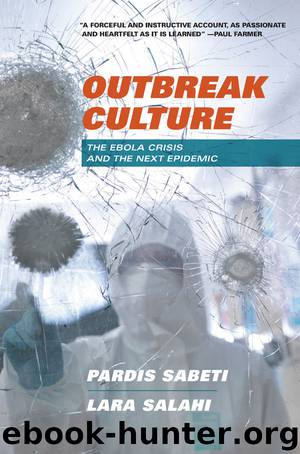Outbreak Culture by Pardis Sabeti

Author:Pardis Sabeti [Sabeti, Pardis]
Language: eng
Format: azw3, epub
ISBN: 9780674976115
Publisher: Harvard University Press
Published: 2018-11-11T16:00:00+00:00
7
INVESTMENT AND ACCOUNTABILITY
Infectious diseases remain one of the biggest risks facing humankind. Few events are capable of equal damage to human lives and livelihoods. Yet the global community spends relatively little to protect populations from the risks of pandemics. Compared with other high profile threats to human and economic security—such as war, terrorism, nuclear disasters, and financial crises—we are underinvested and underprepared.
—Commission on a Global Health Risk Framework for the Future
BY AUGUST 2014, 35 health workers at Kenema Government Hospital had succumbed to Ebola.1 Dr. Sheik Humarr Khan was among them. Local responders had been vital to beating back the epidemic, yet they were the most stigmatized and least cared for group. Many of them had died, and those who survived had even more patients to take care of. Fear and suspicion among family members and neighbors prevented them from returning to their homes.
Days after Khan died, the nurses at Kenema, racked with grief and anger, went out on strike, refusing to return to the Ebola ward without a paycheck and proper protective gear. The country’s Ministry of Health and Sanitation had promised workers the equivalent of $100 per week of hazard pay in return for their commitment to caring for Ebola patients. Workers were used to waiting weeks to get their paychecks, but during the outbreak, those weeks turned into months with no sign of delivery. Demonstrations outside the hospital perpetuated the perception by Sierra Leoneans that the government had orchestrated the epidemic and that hospitals weren’t to be trusted. Meanwhile, conditions for patients worsened inside the already strapped Ebola ward.
People in Kenema awoke one morning to find three corpses exposed and abandoned near Kenema Government Hospital. The night before, a few burial workers had broken in to the town’s morgue and removed more than a dozen bodies. One body was reportedly left near the hospital manager’s office, and two others were laid out at the entrance to the hospital. At least a dozen others were later found on hospital grounds.2
For months, local health workers, including burial teams, had watched as foreign agencies spent thousands of dollars to transport and care for their own staff. They also faced repeated confrontations, escalating demonstrations, and stigma in their own neighborhoods, villages, and homes. The workers had reached their breaking point, and this act was symbolic payback for the poor conditions they endured.
Donations had been pouring in from developed countries, yet local responders received few of the benefits. Less than 2 percent of the $3.3 billion raised globally to fight Ebola was set aside for them.3 The majority of the money went to Western agencies, including more than one hundred nongovernmental organizations, and to the UN.
Boston University infectious disease physician Nahid Bhadelia, who had spent weeks in Kenema in August, had come to know the local nurses. She knew about their families, their fears, and the frustrations of the people they were working so hard to save. She knew the instability the nurses faced when foreign workers dropped in to Kenema for a few weeks and then returned to their epidemic-free countries.
Download
This site does not store any files on its server. We only index and link to content provided by other sites. Please contact the content providers to delete copyright contents if any and email us, we'll remove relevant links or contents immediately.
Periodization Training for Sports by Tudor Bompa(8276)
Why We Sleep: Unlocking the Power of Sleep and Dreams by Matthew Walker(6727)
Paper Towns by Green John(5194)
The Immortal Life of Henrietta Lacks by Rebecca Skloot(4591)
The Sports Rules Book by Human Kinetics(4393)
Dynamic Alignment Through Imagery by Eric Franklin(4218)
ACSM's Complete Guide to Fitness & Health by ACSM(4060)
Kaplan MCAT Organic Chemistry Review: Created for MCAT 2015 (Kaplan Test Prep) by Kaplan(4014)
Introduction to Kinesiology by Shirl J. Hoffman(3776)
Livewired by David Eagleman(3775)
The Death of the Heart by Elizabeth Bowen(3625)
The River of Consciousness by Oliver Sacks(3606)
Alchemy and Alchemists by C. J. S. Thompson(3524)
Bad Pharma by Ben Goldacre(3428)
Descartes' Error by Antonio Damasio(3280)
The Emperor of All Maladies: A Biography of Cancer by Siddhartha Mukherjee(3164)
The Gene: An Intimate History by Siddhartha Mukherjee(3099)
The Fate of Rome: Climate, Disease, and the End of an Empire (The Princeton History of the Ancient World) by Kyle Harper(3067)
Kaplan MCAT Behavioral Sciences Review: Created for MCAT 2015 (Kaplan Test Prep) by Kaplan(2987)
